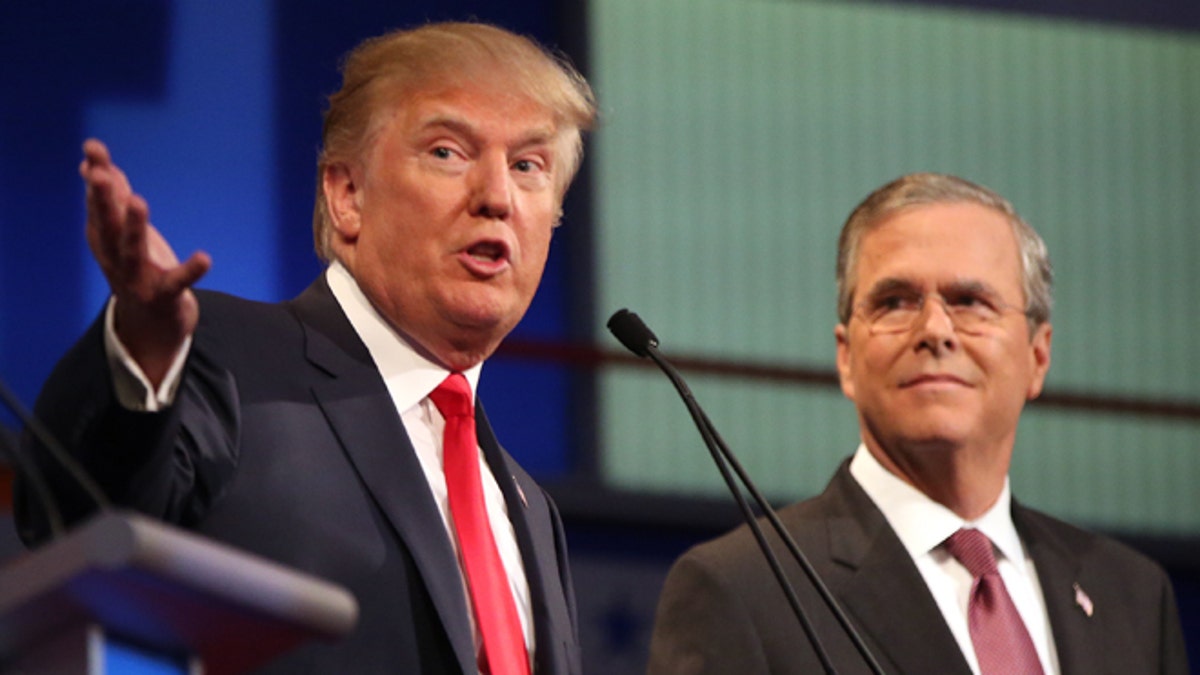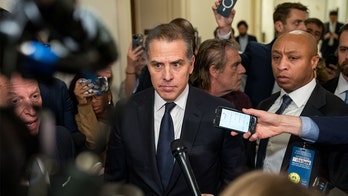
FILE - In this Aug. 6, 2015, file photo, Republican presidential candidates Donald Trump and Jeb Bush participate in the first Republican presidential debate at the Quicken Loans Arena in Cleveland. Trump is going after Bush with a new campaign video about immigration. In the video, Bush is shown saying in a 2014 interview that illegal immigration is "not a felony" but rather an "act of love." The video has images of three men who were in the country illegally and have been charged or convicted in killings. (AP Photo/Andrew Harnik, File)
The second presidential debate, to take place Wednesday, will seek to show viewers the contrasts among the candidates, CNN correspondent Jake Tapper, who will moderate it for the cable news network, told the New York Times.
That will be different from the first debate, which Fox News moderated on Aug. 6, and in which three anchors had more control of the subjects and the candidates.
“My goal is more about: Let’s draw the contrasts between the candidates, and have them fight it out over these policies, over who has the best approach to [Russian president Vladimir] Putin, over who has the best approach to taxes, over who believes what over immigration reform,” said Tapper, according to the New York Times. “Have them lay it all out so voters can see it.”
The debate, which is to begin at 8 p.m. Eastern Time, will be held at the Ronald Reagan Presidential Library in Simi Valley, Calif. A smaller debate, featuring candidates who have not ranked high enough in voter polls to qualify for the primetime one, will take place at 6 p.m. Eastern Time.
Just as with the first debate, many eyes will be on real estate mogul Donald Trump, who continues to enjoy a top slot in polls of Republican voters, and who has not shortage of one-liners and pointed comments about sensitive topics and some of his rivals.
Latino groups, in particular, are urging for the attacks on their community to stop. Several groups, including the Latino Victory Project, released ads hours and days before the debate threatening to step up protests.
“While we have expressed disapproval, the Latino community has not yet organized aggressively to show our political power,” Cristóbal Alex, President Latino Victory Project said in a statement released Tuesday. “Today that ends.”
Later Tuesday, Trump had to cut short a speech aboard USS Iowa in California after he was booed by dozens of Latino protesters.
The Republican candidates are expected to focus their attacks on Trump, who has dominated headlines and airwaves since he announced his candidacy in June.
"Someone has to bring him down," Kentucky Sen. Rand Paul told The Associated Press last week. "I'm not going to sit quietly by and let the disaster that is Donald Trump become the nominee."
Many political observers expect retired neurosurgeon Ben Carson, who has come to be known as the anti-Trump for his gentle, soft-spoken style and easy manner, to show the sharpest contrast to the bombastic Trump.
Yet the 63-year-old Republican, the only African-American seeking the White House in 2016 — has tapped into the same wave of anti-establishment outrage fueling the billionaire realty TV star's rise.
He will likely be standing alongside Trump, given his strong showing recently in polls.
Heading into Wednesday night's debate, Carson finds himself alongside Trump atop the field in polls.
A New York Times/CBS News poll released Tuesday shows Carson favored by 23 percent of likely Republican primary voters compared to Trump's 27 percent. Former Florida Gov. Jeb Bush and Wisconsin Gov. Scott Walker, meanwhile, have plummeted to 6 percent and 2 percent respectively.
It should be noted the poll found that 63 percent said they could change their minds before the primaries begin with the Iowa caucuses in February.
The bragging about Carson’s resume and place in the polls, on the rare occasions it comes, is delivered with none of the superlatives that Donald Trump can't seem to go without.
“The likelihood of someone like me getting through this process and making it to president is virtually impossible," Carson told The Associated Press in a recent interview. "I just have to be myself. And if being myself resonates with the American people, then they will choose me.
The New York Times/CBS poll was just one of several in recent days that feature the political rookies Trump and Carson leading a field of veterans of elected office, offering the clearest example yet that Republican voters have deep frustrations with the political establishment.
It shows in Carson's fundraising, too. His campaign says it has raised $5 million so far this month, adding to the $9 million it pulled in during July and August — a strong performance at what is typically one of the hardest times for candidates to raise money.
Wednesday night offers Carson a new chance to build on that momentum. A stage full of Republican candidates will face off at the Reagan Presidential Library for the party's second formal debate. Carson emerged from the first as a surprise success, his popularity fueled by his nice-guy image on a night when his competitors came out swinging.
Sen. Ted Cruz, of Texas, who has gotten low numbers in polls, is not likely to take on Trump, with whom he has formed a kind of alliance, appearing with him recently at an anti-Iran nuclear deal rally in Washington D.C.
Sen. Marco Rubio of Florida delivered a much-praised performance in the first debate, impressing many with his confident and information-filled statements about various policy ideas.
He took some subtle shots at Trump’s comments about building a wall along the U.S.-Mexico border, saying that people can always build tunnels to get to the United States illegally.
“The problem is if El Chapo builds a tunnel under the fence, we have to be able to deal with that, too,” he said.
And when Trump said he’d donated to the campaigns of many of the candidates on stage, Rubio memorably shot back that he had never gotten any money from the mogul.
“Rubio was polished, optimistic, strong on issues, from immigration to education to the economy, and never once reached out in thirst for an off-screen water bottle,” said CNBC in its assessment of the debate. “Nobody stood out like Rubio.”
The problem for Rubio is that his polls numbers have weakened since earlier in his campaign, when he seemed the one to beat in the GOP field.
In this debate, political observers say, he may have to be more forceful, and deliver more memorable statements to stick out in a more enduring way among voters. Bush, many say, did commendably in the first debate, but needs to be more forceful if he is to regain the strong position he had enjoyed in many polls of GOP voters.
Rick Santorum, Bobby Jindal, George Pataki and Lindsey Graham will participate in the undercard debate at 6 p.m.
The prime-time debate will feature Trump, Carson, Bush, Walker, Cruz, Rubio, former Arkansas Gov. Mike Huckabee, Sen. Rand Paul of Kentucky, Ohio Gov. John Kasich, New Jersey Gov. Chris Christie and Carly Fiorina, the former Hewlett-Packard chief executive.
Many expect Fiorina, considered the winner of the Aug. 6 undercard debate, to come out toughest against Trump, who made offensive comments about her recently, mocking her appearance. He said that was not his intention.
Political observers say she may point to his seemingly sexist comments over the years – which Fox News host Megyn Kelly questioned Trump about in the first debate. She also may question his conservative credentials, strategists say.
For his part, Trump said in an interview with The New York Times that he would not be sexist toward Fiorina. At the same time, he is not going to go easy on her, he added.
“I’m not going to call her honey,” Trump said, according to the Times. “Look, she’s only got 3 percent in the polls, so in order to get recognition, I think she’ll start hitting me. So I think she’s fair game.”
He said he planned to criticize her corporate record. Fiorina was fired as the chief executive of Hewlett-Packard. Like Trump and Carson, she has never served in an elected office.
“I want to talk about her corporate history, her failures at Hewlett-Packard,” Trump said. “And that will be damaging enough to her.”
Strategists say Fiorina can hold her own, having for years navigated the male-dominated corporate world.
“Instead of shutting him down, there’s a way to pat poor Donald, the chauvinistic pig, on the head,” said Rob Stutzman, a Republican strategist in Sacramento, to the Times.
The Associated Press contributed to this report.
Like us on Facebook




